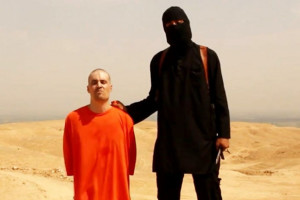Cross-posted from Consortium News
Most Americans associate 9/11 only with the tragic events in 2001 but the date has a very different meaning to Chileans and others who remember the U.S.-backed coup in 1973 that overthrew Chile's elected President Salvador Allende and plunged that peaceful South American nation into the nightmare of military repression.
In recognition of those mixed legacies of September 11th -- and the more recent tragedy of the Islamic State's execution of American journalist James Foley on Aug. 19 -- award-winning Latino poet Martin Espada reflected on these moments of courage and brutality. Espada was one of Foley's college professors and encouraged his commitment to serving others.
His latest collection of poems, The Trouble Ball, is the recipient of the Milt Kessler Award, a Massachusetts Book Award and the International Latino Book Award. The Republic of Poetry received the Paterson Award for Sustained Literary Achievement and was a finalist for the Pulitzer Prize.
A previous book of poems, Imagine the Angels of Bread, won an American Book Award, and was a finalist for the National Book Critics Circle Award. Collections of poems have been published in Spain, Puerto Rico and Chile. His book of essays, Zapata's Disciple, published by Southend Press, has been banned in Tucson as a part of the Mexican-American Studies Program outlawed by the state of Arizona.
A graduate of Northeastern [University] Law School, and a former tenant lawyer, Espada is currently a professor in the Department of English at the University of Massachusetts-Amherst, where James Foley was one of his students.
DB: When people think about September 11th, almost overwhelmingly, especially if you are white, they think about the Twin Towers. But September 11th is an incredibly important date ... September 11th, 1973, because that's when the United States participated in a coup to overthrow the duly elected government, the socialist government of Salvador Allende. You want to talk a little bit about how these come together for you, these two dates? One date " two incidents?
ME: Well, the poet and essayist Ariel Dorfman said, "11 September has been a date of mourning, for me and millions of others, ever since that Tuesday in 1973 when Chile lost its democracy in a military coup." The fact that people in this country only associate 9/11 with events of September 11, 2001, says something about our historical amnesia. It was only in 1973, less than a generation before, when we as a nation hid our collective eyes at the sight of our government orchestrating a military coup in Chile.
For me, this is what happens when you live in the belly of the beast, as they say in Latin America with reference to the United States. What happens when you develop historical amnesia? What are the consequences of forgetting? How is it that, in the end, countless numbers of innocent people are killed? Whether it's on this continent, or that continent, or lands thousands of miles away that have nothing to do with the Americas...
DB: Before we go any further, I would really like you to read "Alabanza: In Praise of Local 100" because it sort of covers the terrain, if you will, that you were just referring to.
ME: Yes. Well, Dennis, as you mentioned, this has become something of a tradition on 9/11, with your program, for me to read this poem. This is the title poem of my collection Alabanza: New and Selected Poems from Norton. I wrote this poem about six months after the attack on the towers, the attacks on 9/11, that killed thousands of people, as you well know. I was struggling at the time it all took place, like everyone else, to make sense of it. I was struggling to find, you might say, a part that would stand for the whole, to find a focus.
Over the days and weeks following 9/11, a new story began to emerge very slowly, began to emerge, as I recall, through the BBC, about one particular restaurant called Windows on the World, and the members of a union there, Hotel Employees and Restaurant Employees, Local 100. Forty-three members of that union had been killed that day, most of them immigrant and many of them undocumented, invisible in life and even more invisible in death, to the extent that some families of these victims couldn't even come forward to claim benefits. They literally vanished without a trace. I consider it a mission of mine -- and in this respect, I'm working very much in the tradition of Neruda and Whitman -- to make the invisible visible.
I began to think about this poem, to research this poem. Ultimately I was able to write it about six months after the fact. Later on, I should say, it appeared in an anthology I want to mention called Poets Against the War, from Nation Books, edited by Sam Hamill, who himself was the founder of Poets Against the War.
DB: I have that right upstairs. I was just reading through it.
ME: Getting back to the poem at hand, it is entitled "Alabanza" -- that's the Spanish word for praise -- "Alabanza: In Praise of Local 100," for the 43 members of Hotel Employees and Restaurant Employees Local 100, working at the Windows on the World restaurant, who lost their lives in the attack on the World Trade Center.
Next Page 1 | 2 | 3 | 4 | 5 | 6 | 7 | 8 | 9 | 10 | 11 | 12 | 13
(Note: You can view every article as one long page if you sign up as an Advocate Member, or higher).






